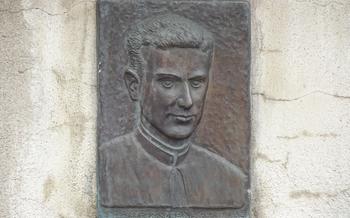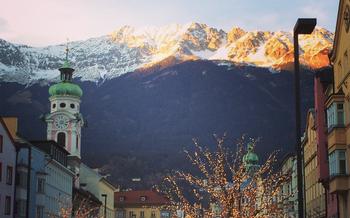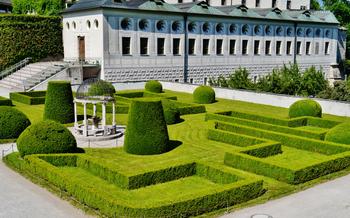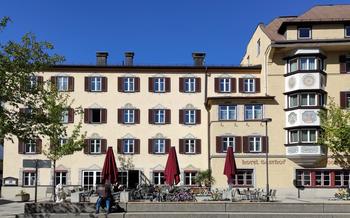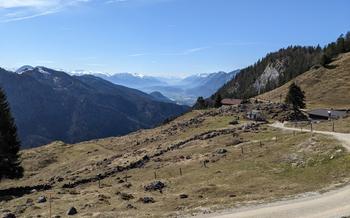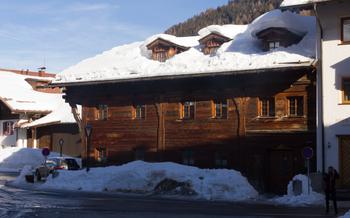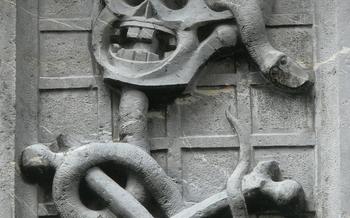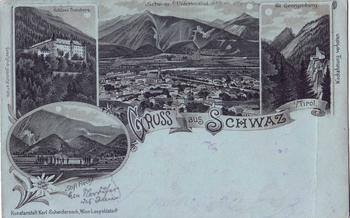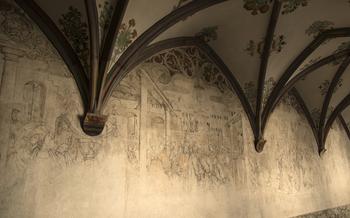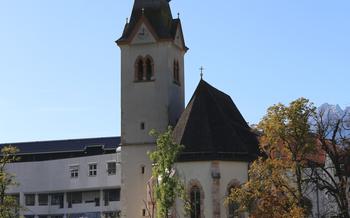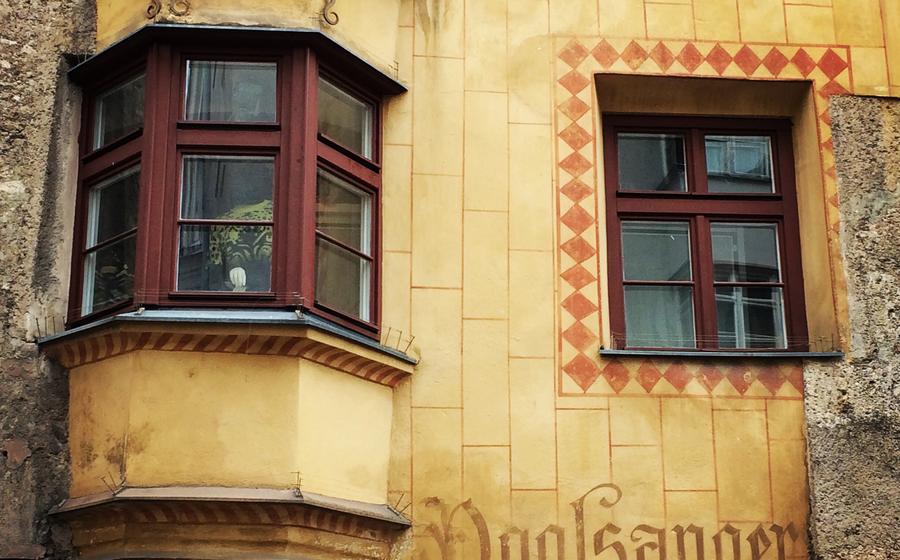
Tiroler Bauernhofmuseum (Tyrolean Farmhouse Museum)
- Exhibits and Collections
- Traditional Tyrolean Architecture
- Farming and Agriculture in Tyrol
- Rural Life and Customs
- Interactive Workshops and Activities
- Guided Tours and Audio Guides
- Museum Shop and Cafe
- Accessibility and Facilities
- Educational Programs for Schools
- Research and Publications
- Sustainability and Environmental Initiatives
- Community Outreach and Events
- Awards and Recognition
- Insider Tip
Exhibits and Collections
The Tiroler Bauernhofmuseum offers a diverse range of exhibits and collections that provide a comprehensive insight into Tyrolean farming culture and rural life. The museum's collection primarily consists of traditional Tyrolean farmhouses and agricultural implements that have been carefully restored and preserved. Visitors can explore various types of farmhouses, including the characteristic "Einhof" (single farm) and the "Mehrhof" (multiple farmsteads), each showcasing the unique architectural features and construction techniques of the region.
Among the highlights of the museum's collection are the numerous artifacts related to traditional farming practices. These include a variety of tools and machinery used for plowing, harvesting, and processing agricultural products. Visitors can also learn about the importance of livestock farming in Tyrol and see a range of traditional breeds of cattle, sheep, and goats. The museum also features interactive displays and educational programs that provide hands-on experiences and allow visitors to engage with the exhibits in a deeper and more meaningful way.
In addition to the permanent collection, the museum regularly hosts temporary exhibitions and special events that focus on specific aspects of Tyrolean culture and history. These exhibitions often feature contemporary artworks, historical documents, and artifacts that shed light on the rich traditions and heritage of the region.
Traditional Tyrolean Architecture
The Tiroler Bauernhofmuseum offers a fascinating glimpse into the unique architectural traditions of the Tyrol region. Tyrolean farmhouses are renowned for their distinctive design, which has evolved over centuries to adapt to the region's mountainous landscape and harsh climate.
One of the most striking features of Tyrolean farmhouses is their steep, gabled roofs, which are designed to shed heavy snowfall and protect the interior from the elements. The roofs are often covered with wooden shingles or stone tiles, which add to the rustic charm of the buildings.
Another characteristic feature of Tyrolean farmhouses is their use of wood as the primary building material. Wood is a natural insulator, which helps to keep the interiors warm in winter and cool in summer. The exterior walls are often decorated with intricate carvings and paintings, which reflect the Tyrolean tradition of craftsmanship.
Tyrolean farmhouses come in a variety of shapes and sizes, depending on their function and the size of the farm. The most common type of farmhouse is the "Einfirsthof," which is a single-family dwelling with a barn and stable attached. Larger farms may have multiple buildings, including a separate dairy, granary, and workshop.
The Tiroler Bauernhofmuseum showcases a variety of traditional Tyrolean farmhouses, including a historic "Einfirsthof" from the 17th century. Visitors can explore the different rooms of the farmhouse, including the living quarters, kitchen, and barn, and learn about the daily life of Tyrolean farmers in the past.
The museum also has a collection of scale models of different types of Tyrolean farmhouses, which provide a fascinating insight into the diversity of architectural styles in the region. These models demonstrate the ingenuity and adaptability of Tyrolean farmers, who have created unique and sustainable homes that are in harmony with their surroundings.
Preservation efforts are underway to protect and restore traditional Tyrolean farmhouses, which are an important part of the region's cultural heritage. Modern interpretations of traditional Tyrolean architecture can be seen in new buildings that incorporate traditional elements into their design, ensuring that the legacy of this unique architectural style continues to live on.
Farming and Agriculture in Tyrol
The history of farming in Tyrol is as rich and diverse as the region itself. For centuries, agriculture has played a vital role in the lives of Tyroleans, shaping their culture, traditions, and economy.
In the past, farming in Tyrol was mainly subsistence-based, with families growing their own food and raising livestock for their own consumption. The harsh climate and mountainous terrain presented challenges for farmers, who had to adapt their practices to the local conditions. They developed a variety of techniques, such as terracing and irrigation, to make the most of the available land.
Livestock, particularly cattle, played a crucial role in Tyrolean agriculture. Cows provided milk, meat, and manure, which was used as fertilizer. Sheep and goats were also important, providing wool and meat. Tyrolean farmers also kept horses for transportation and fieldwork.
In the 20th century, agriculture in Tyrol underwent significant changes. The introduction of modern machinery and technology led to increased productivity and efficiency. Farmers began to specialize in cash crops, such as apples and dairy products, which were sold to markets outside the region.
Today, agriculture continues to be an important part of the Tyrolean economy. Tyrolean farmers are known for their high-quality products, which are produced in a sustainable and environmentally friendly manner. The region is also home to several agricultural cooperatives and farmers' markets, which support local farmers and promote the sale of local produce.
Rural Life and Customs
The Tiroler Bauernhofmuseum offers a unique glimpse into the daily life of Tyrolean farmers, showcasing their rich traditions and customs. Visitors can explore authentic farmhouses, beautifully decorated with intricate wood carvings and traditional Tyrolean motifs, and learn about the unique lifestyle and challenges faced by these resilient mountain people.
The museum's exhibits highlight the importance of farming in the Tyrolean way of life, showcasing traditional farming practices and techniques passed down through generations. Visitors can learn about the cultivation of crops, the breeding and care of livestock, and the production of dairy products, which have played a vital role in sustaining Tyrolean communities for centuries.
One of the highlights of the museum is the recreation of traditional festivals and celebrations, which provide a vibrant and immersive experience of Tyrolean culture. Visitors can witness colorful processions, lively music, and traditional dances that showcase the region's rich heritage. These events offer a unique opportunity to connect with the local community and experience the warmth and hospitality of Tyrolean people firsthand.
Despite the influx of tourism, the Tyrolean region remains committed to preserving its unique identity and way of life. The museum plays a crucial role in this endeavor, serving as a repository of cultural heritage and a platform for promoting local customs and traditions. Visitors to the Tiroler Bauernhofmuseum will leave with a deep appreciation for the resilience, ingenuity, and rich cultural heritage of the Tyrolean people.
Interactive Workshops and Activities
To truly immerse yourself in the Tyrolean way of life, participate in the museum's interactive workshops and activities. These hands-on experiences provide a unique opportunity to learn traditional Tyrolean crafts and skills.
Under the guidance of skilled artisans, visitors of all ages can try their hand at wood carving, pottery, blacksmithing, and other traditional crafts. Seasonal activities and demonstrations add to the interactive experience, showcasing traditional techniques such as cheesemaking, bread baking, and wool spinning.
Families are particularly welcome at the museum, with a range of educational programs and activities designed specifically for children. Interactive exhibits, storytelling sessions, and hands-on workshops keep young minds engaged and entertained while teaching them about Tyrolean culture and history.
Whether you're a seasoned craftsman or a curious beginner, the Tiroler Bauernhofmuseum offers a fun and engaging way to learn about Tyrolean traditions and heritage. Don't miss the opportunity to roll up your sleeves and create your own Tyrolean masterpiece to take home as a lasting souvenir.
Guided Tours and Audio Guides
The Tiroler Bauernhofmuseum offers a variety of guided tours that provide visitors with an in-depth understanding of the museum's exhibits and the history of Tyrolean farming. Guided tours are available in different languages, including English, German, and Italian, and are led by experienced museum educators who share their knowledge and insights about the museum's collection. Visitors can choose from a range of themed tours that focus on specific aspects of the museum, such as traditional Tyrolean architecture, farming techniques, or rural life and customs. Tours typically last between 60 and 90 minutes and can be booked in advance or on the day of your visit.
For those who prefer to explore the museum at their own pace, audio guides are available in several languages. These audio guides provide detailed commentary on the museum's exhibits and offer a flexible and informative way to learn about Tyrolean farming history and culture.
Whether you choose to take a guided tour or use an audio guide, the Tiroler Bauernhofmuseum offers a range of options to enhance your visit and make the most of your time at the museum.
Museum Shop and Cafe
After exploring the fascinating exhibits, visitors can take a break and visit the on-site museum shop. This well-stocked shop offers a wide range of souvenirs and local products, allowing visitors to take home a piece of Tyrolean culture. From traditional handicrafts and souvenirs to local delicacies and regional specialties, the shop offers something for everyone.
The museum also features a charming cafe that serves traditional Tyrolean cuisine and refreshments. Visitors can indulge in hearty Tyrolean specialties, such as Käsespätzle (cheese spaetzle), Tiroler Gröstl (fried potatoes with meat and onions), or Apfelstrudel (apple strudel), while enjoying the panoramic views of the surrounding countryside. The cafe also offers a selection of refreshing drinks and snacks, making it a perfect spot to relax and recharge after a day of exploration.
Accessibility and Facilities
The Tiroler Bauernhofmuseum is committed to ensuring that all visitors, regardless of their abilities, can enjoy and learn from the museum's exhibits and programs. The museum is wheelchair accessible, with designated parking spaces, ramps, and elevators throughout the complex. Baby changing facilities and nursing rooms are also available for the convenience of families with young children.
Guided tours for visitors with disabilities are available by request. The museum staff is trained to assist visitors with special needs, and they can provide assistance with transportation, seating, and other accommodations. The museum also offers audio guides in multiple languages, which can be used for self-guided exploration of the exhibits.
Educational Programs for Schools
The Tiroler Bauernhofmuseum is not just a place to visit and admire, but also a place to learn and grow. The museum offers a variety of educational programs tailored to different grade levels, making it an ideal destination for school field trips and workshops.
Students can engage in interactive learning experiences and hands-on activities that bring the history and culture of Tyrol to life. They can learn about traditional farming practices, Tyrolean architecture, and the daily life of farmers in the region. The museum's knowledgeable staff and educators provide guidance and support, ensuring that students have a meaningful and enjoyable learning experience.
The museum also offers resources for teachers and educators, including lesson plans, activity sheets, and multimedia materials. These resources help teachers integrate the museum's content into their classroom curriculum, allowing students to explore Tyrolean culture and history in greater depth.
Whether it's a guided tour, a hands-on workshop, or a self-guided exploration, the Tiroler Bauernhofmuseum provides an exceptional learning environment for students of all ages. It is a place where history comes alive, and where students can gain a deeper understanding of the rich cultural heritage of Tyrol.
Research and Publications
The Tiroler Bauernhofmuseum is not only a treasure trove of Tyrolean history and culture but also a renowned center for research and education. The museum actively collaborates with universities, research institutions, and scholars to explore various aspects of Tyrolean heritage. This collaboration results in ongoing research projects, academic publications, and educational initiatives. The museum's research focuses on diverse topics, including traditional architecture, farming practices, rural customs, and the impact of tourism on the region. The findings of these research projects are disseminated through publications, books, and academic journals, contributing to the broader understanding of Tyrolean culture and history. The museum's commitment to research and education extends beyond academic circles, as it also offers educational programs tailored to different grade levels. School field trips, interactive workshops, and hands-on activities provide students with an immersive and engaging learning experience. By fostering research and education, the Tiroler Bauernhofmuseum plays a vital role in preserving and promoting the unique cultural heritage of Tyrol.
Sustainability and Environmental Initiatives
The Tiroler Bauernhofmuseum is committed to sustainable practices, recognizing the importance of environmental conservation in preserving the region's cultural heritage. The museum employs a range of measures to reduce its ecological footprint and promote sustainability.
The museum utilizes renewable energy sources, such as solar panels, to generate electricity and heat, minimizing its reliance on fossil fuels. Energy-efficient systems, including LED lighting and motion sensors, are implemented throughout the premises to reduce energy consumption.
Waste management is a priority at the museum. Comprehensive recycling and composting programs are in place to minimize waste generation. Visitors are encouraged to participate in waste reduction efforts, and signage throughout the museum promotes responsible waste disposal.
The museum actively engages in educational initiatives to raise awareness about environmental protection among its visitors. Interactive exhibits and workshops focus on topics such as biodiversity conservation, sustainable agriculture, and climate change. These initiatives aim to inspire visitors to adopt more environmentally friendly practices in their daily lives.
Through its sustainability efforts, the Tiroler Bauernhofmuseum demonstrates its commitment to preserving the natural environment alongside the region's cultural heritage. Visitors are encouraged to embrace sustainable practices during their visit, contributing to the museum's ongoing efforts to protect the environment for future generations.
Community Outreach and Events
The Tiroler Bauernhofmuseum is not just a repository of Tyrolean history and culture; it is also a vibrant cultural hub that actively engages with the local community. Throughout the year, the museum hosts a variety of events, workshops, and exhibitions that celebrate Tyrolean traditions and promote cultural exchange.
These events provide a platform for local artists, artisans, and performers to showcase their talents and share their knowledge with visitors. From traditional music concerts and dance performances to craft demonstrations and workshops, there is something for everyone to enjoy at the Tiroler Bauernhofmuseum.
The museum also collaborates with local organizations and businesses to promote cultural exchange and intercultural dialogue. These partnerships result in unique events and initiatives that bring people from different backgrounds together to learn from and appreciate each other's cultures.
By actively engaging with the local community, the Tiroler Bauernhofmuseum plays a vital role in preserving and promoting Tyrolean heritage while fostering a sense of community and belonging.
Awards and Recognition
The Tiroler Bauernhofmuseum (Tyrolean Farmhouse Museum) has received numerous prestigious awards and accolades for its outstanding contributions to cultural preservation and education. In 2001, the museum was honored with the European Museum of the Year Award, recognizing its innovative approach to museum design and its commitment to promoting cultural understanding. The museum has also been recognized by the Austrian Ministry of Culture for its excellence in museum management and its significant contributions to the preservation of Tyrolean cultural heritage.
The Tiroler Bauernhofmuseum is a member of the International Council of Museums (ICOM) and the Austrian Museum Association, demonstrating its commitment to international collaboration and the exchange of knowledge and expertise. The museum's active participation in these networks allows it to stay at the forefront of museum practices and contribute to the development of innovative approaches to cultural heritage preservation.
Insider Tip
To truly embrace the tranquility of the museum, plan your visit during the off-season, typically from late autumn to early spring. During this time, you'll encounter fewer crowds, allowing you to leisurely explore the exhibits and soak in the authentic atmosphere.
Within the museum grounds, there are hidden gems waiting to be discovered. Keep an eye out for the "secret" herb garden, tucked away behind one of the farmhouses. This serene space offers a delightful sensory experience, with aromatic herbs and colorful flowers.
For photography enthusiasts, the museum presents numerous opportunities to capture stunning shots. The picturesque farmhouses, with their intricate details and mountain backdrop, make for postcard-perfect compositions. Don't miss the chance to capture the charm of the traditional Tyrolean architecture.
After your museum visit, enhance your experience with a culinary adventure at a local restaurant. Just a short walk from the museum, you'll find several authentic Tyrolean restaurants serving mouthwatering regional delicacies. Indulge in traditional dishes like Käsespätzle (cheese noodles) or Tiroler Gröstl (fried potatoes with meat and onions) for a truly immersive Tyrolean experience.
